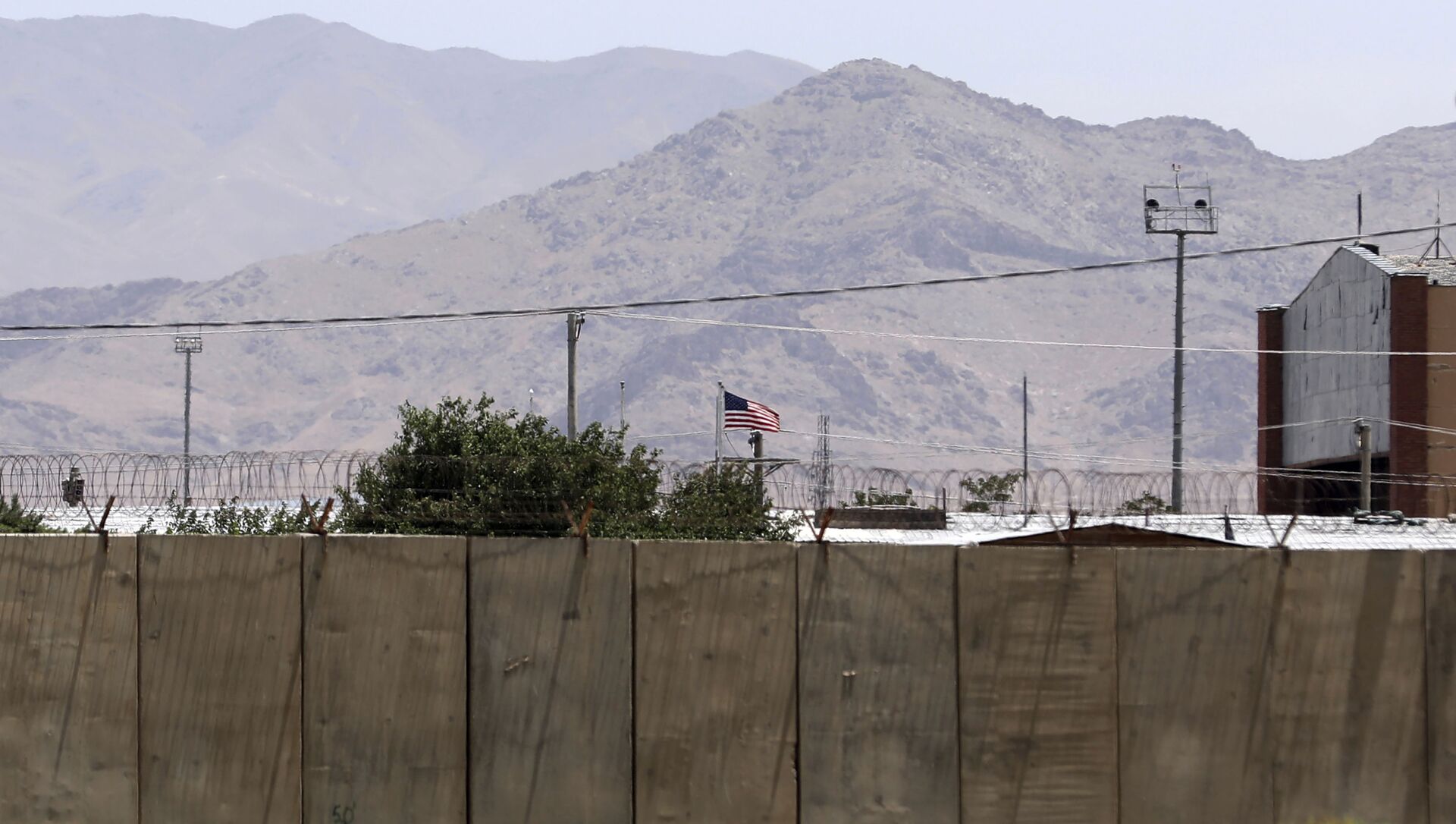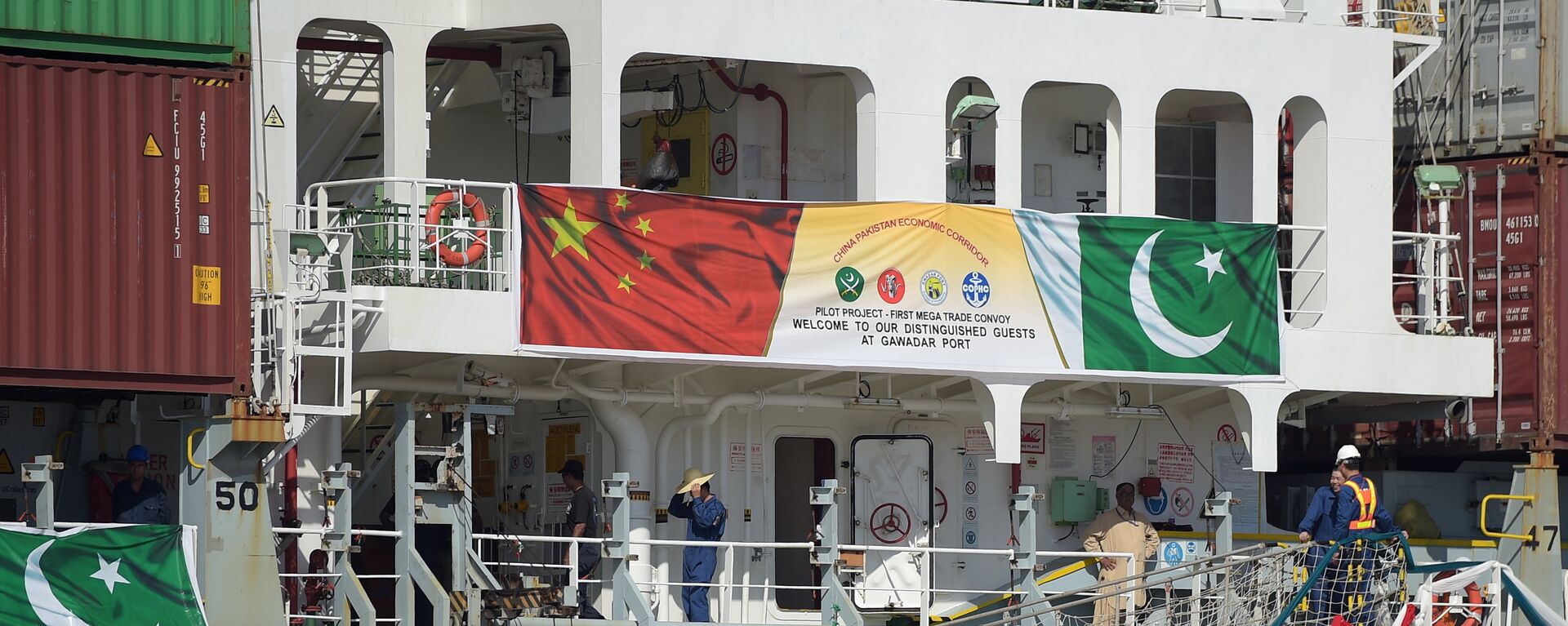https://sputnikglobe.com/20210705/china-to-expand-its-presence-in-afghanistan-under-bri-as-us-leaving-country---report-1083314346.html
China to Expand Its Presence in Afghanistan Under BRI as US Leaving Country - Report
China to Expand Its Presence in Afghanistan Under BRI as US Leaving Country - Report
Sputnik International
Although the Biden administration initially set September 11 as the date for full withdrawal, the US media widely reported that the majority of troops would be... 05.07.2021, Sputnik International
2021-07-05T23:36+0000
2021-07-05T23:36+0000
2022-12-08T16:35+0000
world
newsfeed
middle east
afghanistan
afghanistan war
us forces afghanistan
us troops in afghanistan
united states forces afghanistan
china
belt and road initiative
https://cdn1.img.sputnikglobe.com/img/07e5/07/05/1083314504_0:222:3046:1945_1920x0_80_0_0_05c46e9aba79422ba1b3c3a581e48f77.jpg
China is poised to swoop in and enlarge its cooperation with Afghanistan, subsequently filling the void left by the departing US and NATO forces as they continue pulling out of the war-torn nation, the Daily Beast reported. Citing a source close to Afghan government officials, the outlet claimed that Kabul authorities are increasing their engagement with China on an extension of the $62 billion China-Pakistan Economic Corridor (CPEC), which involves the construction of highways, railways, and energy pipelines between Pakistan and China.One of the specific projects in the discussion is reportedly the construction of a major road funded by China between Afghanistan and Pakistan's northwestern city of Peshawar, which is already connected to the CPEC route.According to the source, as the US leaves the country for good, "Ghani needs an ally with resources, clout and ability to provide military support to his government," even though the negotiations with the Chinese previously made "the US suspicious of President Ashraf Ghani's government."In May, media reported, citing China's foreign ministry, that Beijing was in talks with other parties, including Kabul, about extending the CPEC.According to the report, Beijing may be in an excellent position to pick up where they left off and press Kabul to join the BRI, especially if the Taliban come to power as a result of the US withdrawal. Chinese officials have reportedly been in communication with Taliban leaders on a regular basis since the Trump administration inked a peace accord with the militant group in February.China has launched a range of infrastructure projects in domestic regions close to Afghanistan, such as the construction of the Taxkorgan airport on the Pamirs Plateau in the northwest Xinjiang Uyghur Autonomous Region, which borders Afghanistan. Gwadar harbor in Pakistan's Balochistan province, which borders Afghanistan, was likewise built and is reportedly operated by China. Both projects are being constructed as part of the CPEC.China's Belt and Road Initiative aims to connect Asia with Africa and Europe via land and maritime networks covering 60 nations. At a cost of $4 trillion, the initiative will not only improve inter-regional connections, but also strengthen China's global influence. Afghanistan can give China a strategic platform that is perfect for serving as a commercial hub connecting the Middle East, Central Asia, and Europe.During a trilateral Afghanistan-China-Pakistan meeting early last month, the foreign ministers of Islamabad and Beijing pledged to "expand economic and trade ties" with Afghanistan, as well as to "play a bigger role" in the country's reconciliation process following the withdrawal of American and other NATO-allied troops from the nation.On Friday, the last US troops left Bagram Airfield, which was the US's main military facility in Afghanistan until recently.
https://sputnikglobe.com/20210604/afghanistan-backs-bigger-role-for-pakistan-amid-deepening-cooperation-with-china-on-bri-projects-1083071056.html
afghanistan
china
Sputnik International
feedback@sputniknews.com
+74956456601
MIA „Rossiya Segodnya“
2021
News
en_EN
Sputnik International
feedback@sputniknews.com
+74956456601
MIA „Rossiya Segodnya“
Sputnik International
feedback@sputniknews.com
+74956456601
MIA „Rossiya Segodnya“
newsfeed, middle east, afghanistan, afghanistan war, us forces afghanistan, us troops in afghanistan, united states forces afghanistan, china, belt and road initiative, us
newsfeed, middle east, afghanistan, afghanistan war, us forces afghanistan, us troops in afghanistan, united states forces afghanistan, china, belt and road initiative, us
China to Expand Its Presence in Afghanistan Under BRI as US Leaving Country - Report
23:36 GMT 05.07.2021 (Updated: 16:35 GMT 08.12.2022) Kirill Kurevlev
Managing Editor
Although the Biden administration initially set September 11 as the date for full withdrawal, the US media widely reported that the majority of troops would be out by early July. However, last week Biden said that there would still be "some forces left" even after the September deadline, leaving Kabul with a vital question about its own future.
China is poised to swoop in and enlarge its cooperation with Afghanistan, subsequently filling the void left by the departing US and NATO forces as they continue pulling out of the war-torn nation, the Daily Beast
reported.
According to the report, with its Belt and Road Initiative (BRI), China is getting ready to make an uncontested entry into post-US Afghanistan.
Citing a source close to Afghan government officials, the outlet claimed that Kabul authorities are increasing their engagement with China on an extension of the $62 billion China-Pakistan Economic Corridor (CPEC), which involves the construction of highways, railways, and energy pipelines between Pakistan and China.
China has reportedly long wanted to expand its BRI to Afghanistan and has been requesting Kabul's participation for at least a decade.
One of the specific projects in the discussion is reportedly the construction of a major road funded by China between Afghanistan and Pakistan's northwestern city of Peshawar, which is already connected to the CPEC route.
"There is a discussion on a Peshawar-Kabul motorway between the authorities in Kabul and Beijing," an undisclosed source is quoted in the report as saying. "Linking Kabul with Peshawar by road means Afghanistan’s formal joining of CPEC."
According to the source, as the US
leaves the country for good, "Ghani needs an ally with resources, clout and ability to provide military support to his government," even though the negotiations with the Chinese previously made "the US suspicious of President Ashraf Ghani's government."
In May,
media reported, citing China's foreign ministry, that Beijing was in talks with other parties, including Kabul, about extending the CPEC.
According to the report, Beijing may be in an excellent position to pick up where they left off and press Kabul to join the BRI, especially if the Taliban come to power as a result of the US withdrawal. Chinese officials have reportedly been in communication with Taliban leaders on a regular basis since the Trump administration inked a peace accord with the militant group in February.
"The Taliban certainly offers a more unified partner to Chinese. But other regional countries have been trying to bring together warlords to think of resistance rather than of peace with the Taliban," the source stated.
China has launched a range of infrastructure projects in domestic regions close to Afghanistan, such as the construction of the Taxkorgan airport on the Pamirs Plateau in the northwest Xinjiang Uyghur Autonomous Region, which borders Afghanistan. Gwadar harbor in Pakistan's Balochistan province, which borders Afghanistan, was likewise built and is reportedly operated by China. Both projects are being constructed as part of the CPEC.
And the outlet concludes that China requires peace to expand its Belt and Road projects to its war-torn western neighbor. So the Chinese authorities reportedly have offered the Taliban billions of dollars in infrastructure and energy projects in exchange for an end to hostilities in Afghanistan.
China's Belt and Road Initiative aims to connect Asia with Africa and Europe via land and maritime networks covering 60 nations. At a cost of $4 trillion, the initiative will not only improve inter-regional connections, but also strengthen China's global influence. Afghanistan can give China a strategic platform that is perfect for
serving as a commercial hub connecting the Middle East, Central Asia, and Europe.
During a trilateral Afghanistan-China-Pakistan meeting early last month, the foreign ministers of Islamabad and Beijing pledged to "expand economic and trade ties" with Afghanistan, as well as to "play a bigger role" in the country's reconciliation process following the withdrawal of American and other NATO-allied troops from the nation.
On Friday, the last US troops
left Bagram Airfield, which was the US's main military facility in Afghanistan until recently.



